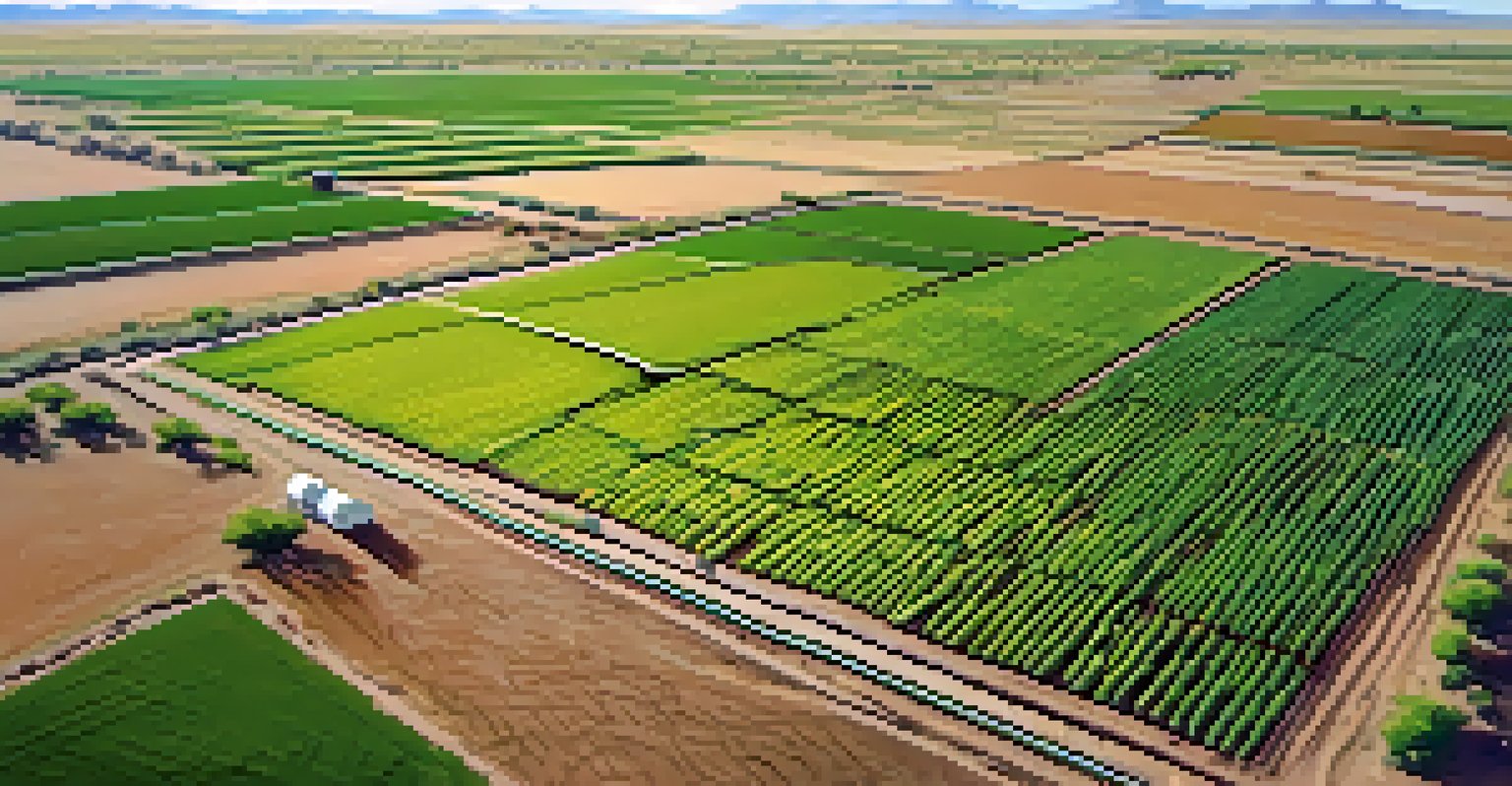The Impact of Climate Change on Tucson's Water Resources

Understanding Tucson's Unique Climate Challenges
Tucson, located in the Sonoran Desert, faces unique climate challenges that make water resource management critical. With its arid environment, the city relies heavily on limited water supplies, including groundwater and surface water from the Colorado River. Climate change adds complexity to this situation by intensifying droughts and altering precipitation patterns, affecting availability and distribution.
Water is the driving force of all nature.
The region typically experiences high temperatures and low annual rainfall, but as climate change progresses, the frequency and severity of heatwaves are expected to increase. This not only affects local ecosystems but also elevates water demand for agricultural and urban uses. Understanding these challenges is essential for developing sustainable practices.
Moreover, the rising temperatures can lead to increased evaporation from reservoirs and soil, further diminishing available water. Thus, Tucson's unique climate conditions, compounded by climate change, create a pressing need for innovative water management solutions.
The Role of Groundwater in Tucson's Water Supply
Groundwater serves as a crucial lifeline for Tucson, accounting for a significant portion of the city's water supply. In times of drought, residents and farmers alike turn to this underground resource, making its sustainability paramount. However, over-reliance on groundwater can lead to depletion, especially as climate change exacerbates drought conditions.

As temperatures rise and precipitation becomes more erratic, groundwater recharge rates can decline. This means that while demand may increase during dry spells, the natural replenishment of these aquifers slows down. Consequently, managing this precious resource becomes a balancing act between consumption and conservation.
Tucson Faces Water Resource Challenges
The city's unique climate, exacerbated by climate change, intensifies water scarcity and highlights the need for sustainable management practices.
To address this challenge, Tucson has implemented various groundwater management strategies, such as water banking, which allows users to store excess water during wet years for use during droughts. These efforts emphasize the importance of sustainable practices in preserving groundwater for future generations.
Surface Water Sources and Their Vulnerability
Tucson's surface water sources, primarily the Colorado River, are vital for sustaining the region's water supply. However, climate change threatens these sources through reduced snowpack in the mountains and altered runoff patterns. As the river's flow diminishes, Tucson's access to this essential resource may dwindle.
The future will either be green or not at all.
Furthermore, increased evaporation rates due to higher temperatures can exacerbate the situation, leading to less water availability for both urban and agricultural needs. This vulnerability highlights the importance of diversifying water sources and developing resilient infrastructure to adapt to changing conditions.
In response to these challenges, local authorities are exploring alternative water sources, such as rainwater harvesting and recycled water systems. These initiatives aim to reduce reliance on traditional surface water and ensure that Tucson can meet its water needs in a sustainable manner.
Impact on Agriculture and Food Security
Agriculture plays a significant role in Tucson's economy and culture, but climate change poses serious threats to this sector. As water resources become scarcer, farmers face challenges in maintaining crop yields and sustaining their livelihoods. The impact on agriculture can also ripple through the community, affecting food security and local markets.
Rising temperatures and prolonged droughts can lead to reduced harvests and increased competition for water resources. Farmers may struggle to keep up with the demands of irrigation, which is essential for growing crops in the arid climate of Tucson. This situation necessitates innovative farming practices that optimize water use and enhance resilience.
Groundwater Management is Crucial
Over-reliance on groundwater for irrigation and drinking water necessitates effective management strategies to ensure long-term sustainability.
Farmers are increasingly adopting techniques such as drip irrigation and drought-resistant crops to mitigate the impact of climate change. By embracing these innovations, the agricultural sector can not only adapt but thrive in an uncertain climate, contributing to the overall food security of Tucson.
The Importance of Community Awareness and Involvement
As climate change impacts Tucson's water resources, community awareness and involvement become crucial. Educating residents about water conservation practices can significantly influence how water is used and preserved. Simple actions, like fixing leaks and using water-efficient appliances, can collectively make a big difference.
Moreover, fostering a culture of sustainability encourages individuals and businesses to adopt eco-friendly habits. Community engagement can lead to innovative solutions, such as local conservation programs and initiatives to restore native vegetation that aids in water retention.
By working together, Tucson's residents can create a stronger community response to climate change. Awareness and proactive involvement can help safeguard water resources for future generations, ensuring that Tucson remains resilient in the face of environmental challenges.
Technological Innovations in Water Management
Technological advancements are playing a pivotal role in tackling water resource challenges in Tucson. From smart irrigation systems to real-time monitoring of water usage, these innovations help maximize efficiency and reduce waste. Such technologies empower both residents and local authorities to manage water resources more effectively.
For instance, smart irrigation systems adjust watering schedules based on real-time weather data, minimizing unnecessary water use. This not only conserves water but also helps maintain healthy landscapes and agricultural fields. By leveraging technology, Tucson can adapt to changing conditions while promoting sustainable practices.
Community Involvement is Essential
Engaging residents in water conservation efforts can significantly impact Tucson's ability to adapt to climate challenges and preserve resources.
Additionally, water recycling and desalination technologies are being explored as potential solutions to augment the city's water supply. These innovations provide hope that Tucson can navigate the challenges posed by climate change while ensuring a reliable and sustainable water future.
Policy Changes Needed for Sustainable Water Management
Effective policies are essential for guiding Tucson's water management strategy in the face of climate change. Policymakers must prioritize sustainable practices that protect existing water resources while encouraging conservation and innovation. This could include revising water allocation frameworks to reflect the changing climate and its impacts on supply and demand.
Incorporating climate resilience into water management policies can help safeguard Tucson's water future. By setting clear goals for water conservation and investing in infrastructure, the community can better prepare for potential shortages and environmental challenges. Collaborative efforts between government, businesses, and residents will be key to achieving these objectives.

Furthermore, policies that incentivize water-efficient technologies and practices can foster a culture of sustainability. By aligning economic interests with environmental goals, Tucson can create a more resilient water management system that benefits everyone.